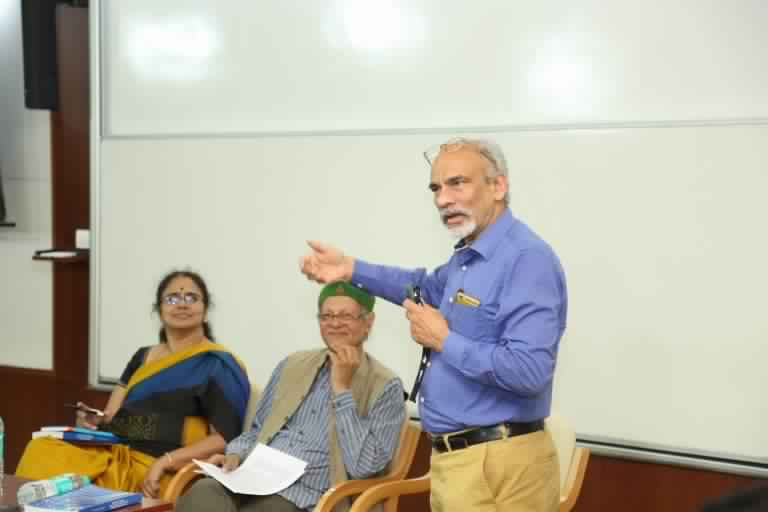
Professor Pradip Khandwalla, from IIM Ahmedabad, speaks on ‘What is Civilizational
Greatness? What bearing does this have on India and Indians?’ during the launch of his
latest book at IIMB on February 28.
Prof. Khandwalla, Independent Management Consulting Professional and Former Director of IIM Ahmedabad, delivered a talk around issues and pathways towards civilizational greatness, at IIM Bangalore, on February 28 (Wednesday), 2018.He went on to say, “We often revile the government for being run by money and power hungry politicians and bureaucrats, which is partly true. But many government bodies in India have made a significant positive impact on society like the National Dairy Development Board, Indian Space Research Organization, etc. The Election Commission has ensured that elections in India, by and large, are fair. The mid-day meal scheme of the government is also commendable.”
He pointed out that the vices of the business sector, like widespread tax evasion, price fixing, illegal dumping of waste, gender inequality, use of child labor, bribing government officials for gain, take us a step backward. “Are we living in a business civilization, or business loot, is a question to ask,” he said, adding that, “But I also encounter instances of corporate decency displayed by the Tatas, Aditya Birla Group, L&T, Grameen Bank in Bangladesh, etc.

Prof. Vasanthi Srinivasan, faculty from the Organizational Behavior & Human
Resources Management area at IIMB, with Prof. Pradip Khandwalla and Professor
G Raghuram, Director of IIM Bangalore.
He said he was faced by a paradox. “On one hand, especially in India and other emerging economies, there is growing prosperity through market economy and a development-oriented state, and a lot of freedom through democratization and liberalization. But on the other hand, violence, corruption, and fraud are on a rampage. The challenge is to build a civilization which preserves the strengths of market economy, democracy, and a development-oriented state, and to mitigate the moral rot”.He gave the example of Sweden, talking about the choices the country has made over the years. “Sweden has taken decisive steps to foster organization excellence. Its measures to build social democracy created a welfare state which became a role model for many other nations. It invested heavily in R&D to foster rapid industrial growth based on innovations, industrial peace, technology, and today it ranks above many other nations in terms of innovativeness, sustainable development, gender equality, inclusiveness, quality of governance, etc. It is also a major contributor of foreign aid to needy countries, and contributor for humanitarian and peace keeping purposes”.
About civilizational greatness in the modern context, he said it was not about being a super economic or political power, but to become more and more humane, creative, and a performance excellence seeking society. A humane civilization nurtures and upholds the best virtues of human kind, he observed.
“The widespread pursuit of creativity and innovation, as well as of performance excellence and altruism, in the major institutes of a nation, namely the state, the civil society and the business sector, when aligned, can unleash a powerful virtuous cycle. Civilization becomes a rising spiral of excellence. This is the core thought that I have tried to project in my book.”
He discussed his ideas and recommendations on how to groom children, to improve pedagogy through audio visual mode of teaching, activity-based learning, etc., how to transform conservative traditions into dynamic ones, the transformative role that civil society organizations can play, and how to improve business behaviour and public administration. He also spoke about fostering strong partnerships to achieve these.
“Finally, the book talks about a powerful youth empowerment programme to facilitate rapid advancement towards civilizational excellence. This will yield to the country millions of competent young citizens and change agents”.
He concluded by discussing the vision of India’s rise in our times as a civilization at the dawn of our independence. “Long ago India made a tryst with destiny. The time has come to redeem our pledge. Not wholly or in full measure, but substantially. A new vision is needed of a humane, creative, and excellence committed society”.
Earlier in the day, Professor Vasanthi Srinivasan, IIMB faculty from the Organizational Behavior & Human Resources Management area, while introducing the speaker, said that Professor Khandwalla’s name was cited as a role model scholar in the field of Organizational Behavior, someone who is making a difference in the way practice and thinking happens in India, in a largely global context being able to understand and influence phenomena.

Professor G. Raghuram, Director, IIM Bangalore, says Professor Khandwalla is someone
who brings in freshness to the learning environment.
Professor Pradip Khandwalla’s contribution, she added, as stated in the book, ranges from organization design, creativity, management of social applications of creativity, styles of management, humane turnaround of organizations from sickness, effective public administration and democratic governance, to design of societies for promoting excellence. “He is a poet and has done a lot of translation as well.”Professor G. Raghuram, Director, IIM Bangalore, said that Professor Khandwalla is someone who brought in freshness to the learning environment. “He has a novel way to teach to internalize ideas and integrates teachings from Indian civilizational and cultural history. He is also supportive of people who want to do new things and promotes research and entrepreneurship. Maybe one of the first courses on entrepreneurship in any IIM, ‘Laboratory and Entrepreneurial Motivation’, was one of the most popular courses taught by Professor Khandwalla at IIM Ahmedabad”. He added that the professor’s new book is his perspective of growth, spanning the individual, organization, nation and civilization.
